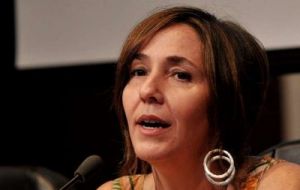MercoPress. South Atlantic News Agency
Fidel admits ‘full responsibility’ for the ‘unjust’ persecution of gays and lesbians
 However Mariela Castro says transsexuals are still discriminated in Cuba
However Mariela Castro says transsexuals are still discriminated in Cuba Former Cuban leader Fidel Castro acknowledges the persecution of gays and lesbians during the Revolution, according to an interview published Tuesday in the Mexican newspaper La Jornada.
Throughout the 1960s and '70s, Cuba sent openly gay men to labor camps without charge or trial.
“They were moments of great injustice, great injustice!” Castro told journalist Carmen Lira Saade from La Jornada. “If someone is responsible, it's me”.
His comments came in the second installment of a two-part interview. The first half of the interview -- a wide-ranging, five-hour conversation at his home -- was published Monday.
“We had so many and such terrible problems, problems of life or death, that we didn't pay it enough attention” Castro said of the way gays and lesbians were treated.
“We were fighting CIA attempts to oust the revolution and they even infiltrated my people, they were terrible times, fully concentrated on political and survival issues”.
Fidel however was careful not to make responsible the ruling Communist Party.
In 1979, Cuba decriminalized homosexual acts and more recently, there have been efforts to legalize same-sex unions.
During the interview the leader praised the anti-homophobic campaign headed by her niece Mariela, (daughter of President Raúl), who is the director of the National Centre for Sex Education. However last January Mariela was particularly critical of the hegemonic Cuban Communist Party that, she said still discriminates against gays and lesbians and deep reforms are needed to eradicate long rooted concepts.
The former leader whose popular Revolution seized power in 1959, ruled the island nation until ill health forced him to transfer power to his younger brother (82) Raul Castro in 2006.
In the La Jornada interview, Fidel Castro also talked about the impact of the five-decade U.S. embargo on Cuba. “The biggest problem was always medicine and food, which is true even today,” he said.
While the embargo prevented Cuba from trading with much of the world, it also encouraged the country to be more creative, Castro said.
“The fight, the battle that we had to carry out, led us to make greater efforts than we would have made without the blockade,” he explained.
The United States imposed the embargo against Cuba in 1961 after Castro's government began seizing private land and nationalizing private companies and Havana levied heavy taxes on American goods.




Top Comments
Disclaimer & comment rules-

Read all commentsMany countries are relaxing their previous attitude against gay and lesbian behavior, even same sex marriage. However, this does not make such behavior normal. No parent would ever want a gay or lesbian child. It is against natural and divine law.
Sep 01st, 2010 - 02:53 am 0Commenting for this story is now closed.
If you have a Facebook account, become a fan and comment on our Facebook Page!